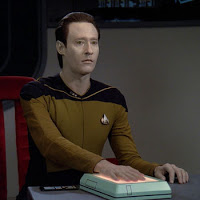 Submitted by Jacob Weiskopfh Ph.D on
Submitted by Jacob Weiskopfh Ph.D on

https://isorepublic.com/photo/mr-spock-street-art/ CC0 Creative Commons
Ploddingly detailed expository arguments deserve a central role in academic philosophy. Yay for boring stuff![*] But emotionally engaging fiction can be philosophy too. And science fiction or "speculative fiction" has a special philosophical value that is insufficiently appreciated by mainstream philosophers.
Canonically recognized Western philosophers have often worked through fiction: Sartre's plays, Camus's stories, Nietzsche's Zarathustra, Rousseau's Emile and Heloise, to some extent Plato's dialogues, and (a personal favorite) Voltaire's Candide. My favorite non-Western philosopher, Zhuangzi, often uses brief parables or goofy stories (such as his famous butterfly dream). And I would argue that great works of fiction are often philosophical in the sense that they inspire, or become the medium of, potentially transformative reflection on the human condition -- even if those works aren't normally treated as "works of philosophy". In the Western literary tradition, for example: Shakespeare, George Eliot, Dickens, Dostoyevsky, Proust, Faulkner.
What is philosophy? I reject the idea that philosophy is argument. If philosophy is argument, then Confucius's Analects is not philosophy, and the pre-Socratics' fragments are not philosophy, and the aphorisms of Nietzsche and Wittgenstein are not philosophy. I say, instead: If an essay, or a parable, or a dialogue, or an aphorism, or a movie engages the reader toward new reflections on fundamental questions about meaning, value, the human condition, the nature of knowledge or art or morality or love or mentality, pushing us out of our settled and conventional ways of thinking, challenging us to explore and reconsider -- that's philosophy. Most real philosophy, as experienced by most people, takes the form of fiction.
Although expository essays have many virtues, they also have limitations. Compared to fictions, expository essays tend to lack imaginative specificity and emotional power. Philosophy looks different through the lens of imagination and emotion. It's one thing to consider, wholly abstractly, some principle like "in an emergency, you should act to maximize the expected number of lives saved". Maybe it sounds pretty good in the abstract (perhaps with some modifications to consider quality of life or expected remaining life years). But it's hard really to evaluate an abstract claim without trying some thought experiments. For example, if the only way to save five innocent people in a hideout would be to kill a noisily crying baby, ought you do it, as the abstract principle says you should?
Our philosophical evaluations are dry and empty if we don't challenge ourselves to emotionally engage with imaginatively vivid scenarios and consequences. We needn't always judge that overall the best thing to do is the thing that's most emotionally attractive when vividly imagined, but we should at least think through how it might really feel to live one way or another. Philosophers' paragraph-long thought experiments start us down the path. But more vivid, richly imagined fictions take us farther. Fiction and abstract expository argument have complementary roles to play in philosophy. Each needs the other.
Science fiction or speculative fiction deserves a special role. "Literary fiction" imagines scenarios that are broadly within the normal run of human experience. Speculative fiction, as I define it, imagines scenarios beyond the normal run of human experience. Speculative fiction can pull apart things that normally go together, can highlight and exaggerate one aspect of life so that we can see it better, can imagine possible transformations of our world and society. Speculative fiction, when written with philosophical purpose, is philosophical thought experiment with blood and bones.
Consider George Orwell's 1984 and Animal Farm, Ursula K. Le Guin's "The Ones Who Walk Away from Omelas", great philosophical SF movies like The Matrix and Her, great philosophical TV shows like Star Trek: The Next Generation or Black Mirror. All of them imagine a way the world could be, or a helpfully simplified and cartooned world with certain aspects exaggerated, and they challenge us to think better about fundamental questions of human value and the human condition -- and they do so in a way that no abstract essay could.
Today in my upper-division class Philosophy of Mind I will teach Star Trek: The Next Generation's episode on whether the robot Data deserves human rights, alongside expository prose by John Searle and Daniel Dennett's famous philosophical story "Where Am I?". Terrific philosophy, all -- one no less than the others.

https://memory-alpha.fandom.com/wiki/The_Measure_Of_A_Man_(episode)
Eric Schwitzgebel
http://schwitzsplinters.blogspot.com/2019/05/science-fiction-as-philosophy.html
- 392 reads